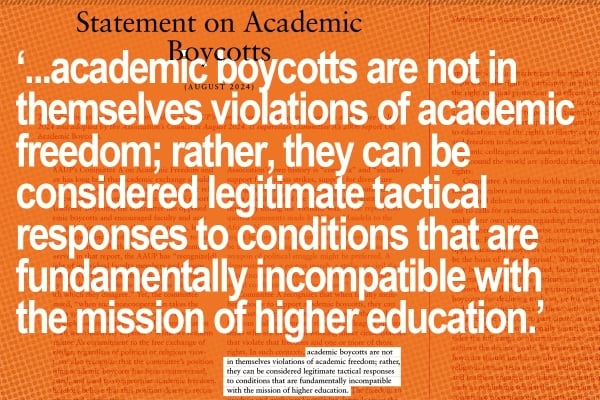The American Association of University Professors (AAUP) has announced that it is ending its two-decade long opposition to academic boycotts. This decision marks a significant shift in the organization’s stance on the issue, which has been a contentious topic among its members for years.
The AAUP had previously taken a firm stance against academic boycotts, arguing that they infringed on the principles of academic freedom and undermined the exchange of ideas and knowledge. However, in a statement released earlier this week, the organization stated that it would no longer actively oppose such actions.
The decision comes in the wake of growing support for academic boycotts as a means of protest against human rights violations, particularly in the Israeli-Palestinian conflict. Over the years, many academic associations and institutions around the world have endorsed academic boycotts as a way to pressure governments and institutions to address these violations.
The AAUP’s decision to end its opposition to academic boycotts reflects a changing landscape in academia, where scholars are increasingly using their expertise and influence to advocate for social justice and human rights. By allowing for the possibility of academic boycotts, the AAUP is aligning itself with the growing movement of academics who believe that their work should not be complicit in perpetuating injustice.
However, the organization’s decision is not without controversy. Some members of the AAUP argue that academic boycotts are a violation of academic freedom and a form of censorship. They worry that endorsing such actions could have a chilling effect on scholarly exchange and collaboration.
Despite these concerns, the AAUP’s decision to end its opposition to academic boycotts indicates a willingness to engage in difficult conversations about the role of scholars in addressing social and political issues. By opening the door to academic boycotts, the organization is acknowledging that the pursuit of knowledge and truth cannot be divorced from the broader ethical and moral considerations of our society.
As the AAUP moves forward with this new stance on academic boycotts, it will undoubtedly face challenges and pushback from some of its members. However, by taking a more nuanced approach to this divisive issue, the organization is demonstrating its commitment to upholding the values of academic freedom while also recognizing the importance of using scholarship as a tool for social change.


